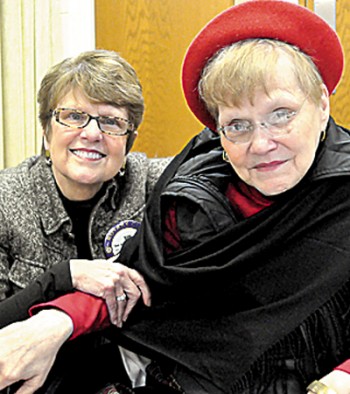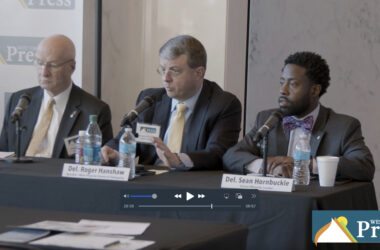
Catherine Moore-Blumer, right, poses with her sister, Sue Johnson-Phillippe, after Tuesday’s meeting of the Buckhannon Rotary Club. Moore-Blumer contracted the polio virus at age 10.
BUCKHANNON, W.Va. – Catherine Moore-Blumer remembers the fear she felt as a child the night she woke up unable to walk.
In 1949, she was a bouncing third-grader who loved twirling lessons. At age 10, she contracted the polio virus and suffered paralytic effects. Moore-Blumer shared her story Tuesday at a meeting of the Buckhannon Rotary Club.
In the summer, Moore-Blumer enjoyed swimming in Thornapple Lake in Michigan with her family. It was one of these occasions which changed the lives of all of her family members.
As it turned out, the lake was contaminated with the polio virus. Moore-Blumer, four of her siblings and her father all contracted the virus. Moore-Blumer was hardest hit and was the only one to experience lingering effects. Two of her siblings did not have to be hospitalized. But of the nine-member family, only three did not contract polio.
Sue Johnson-Phillippe is Moore-Blumer’s sister and was fortunate to be spared. She was only a baby, so her mother kept her behind on the shore while the rest of the family went swimming. The family’s oldest sister was visiting a friend, sparing her from contracting the virus.
Moore-Blumer remembers the onset of the symptoms.
“I was taking twirling lessons and it was really fun. We went to Olivet College and twirled with the Olivet Band. My teacher was worried about me because I wasn’t feeling well and finally was not able to go to class. Dad had been sick, too,” she said.
Moore-Blumer’s first doctor’s visit did not produce a diagnosis, she said.
“My mother took me to the doctor and he said, ‘She has the summer complaint. Take her home and put her to bed,'” she said. “I remember falling down the stairs on the way out of the doctor’s office.”
It wasn’t long before it became apparent that something far worse was happening to Moore-Blumer than the “summer complaint.”
“My mother kept me in the downstairs bedroom so I wouldn’t have to walk upstairs. I remember when everyone was trying sleep and I had to go to the bathroom and couldn’t move. I was so scared,” she said.
After her affliction was confirmed to be polio, Moore-Blumer’s childhood life became a routine of rehabilitation. But it also was a time when her strength and perseverance stood out.
“I had to attend many rehabilitation sessions and my parents also assisted me when I was home. The routine of the day was to receive hot packs in the morning, with your arms and legs wrapped in hot wool. It was an excruciating experience. Often, I would get blisters from the hot wool that was taken out of a machine that looked like a pressure cooker,” she said.
Later in the morning, she received cool “prone-packs,” which were more soothing and allowed her to sleep.
“In the afternoon, I went to physical therapy and remember how excited I was when they got me up and helped me learn to walk with crutches,” she said.
Moore-Blumer overcame many obstacles, facing the challenges head-on and succeeding with the help of family and friends.
“My parents worked with family and friends so that I was able to attend two different rehabilitation schools. This required that I live with family or friends until I finished seventh grade,” she said. “Once I entered high school, I made many friends.”
Johnson-Phillippe said after years of attending “rehabilitation schools,” her sister wanted to “attend school just like the rest of the kids.”
“My father was able to convince the school board to allow my sister to attend. Because we only had one car, the school principal arranged to have Rotary provide the funds so that my sister could take a taxi to and from school,” she said.
Moore-Blumer was prom queen her senior year of high school.
Through her life, Moore-Blumer has struggled with post-polio syndrome, which causes further weakening of muscles and other serious problems. She survived an aneurysm and a fall that broke her neck. She broke her right leg 14 times and eventually developed osteomyelitis, which ultimately resulted in amputation.
Despite these challenges, her resolve has remained strong. She found love twice in her adult life, first marrying Howard Moore, who bought her a Cadillac with hand controls so she could drive. After Moore died, she married Jim Blumer, who also loved her unconditionally until his death in 2006.
“I would have to say both my husbands supported me without regard to the effects polio had with any physical limitations or system issues,” she said. “They encouraged me without limitations.”
Johnson-Phillippe said her sister was stubborn, tenacious and her strength was limitless. One day soon, she hopes to pen a children’s book with her sister as inspiration to teach children not to harbor prejudice for individuals who have special needs.
“I think what I found being the little one in the family and observing and working with Catherine all my life is I saw a lot of discrimination going on. Sometimes people didn’t even know it,” she said. “That’s something I would like to help teach children about, not holding preconceived notions about people with special needs of any kind.”
Working to eradicate the polio virus from the world are Rotary International and the Rotary Clubs in our area, in partnership with the World Health Organization, The United Nation’s Children’s Fund, The Centers for Disease Control and Prevention and the Overseas Development Agencies of Donor Nations.





